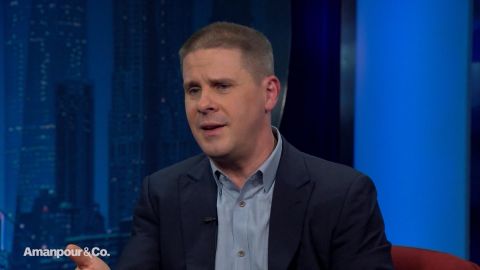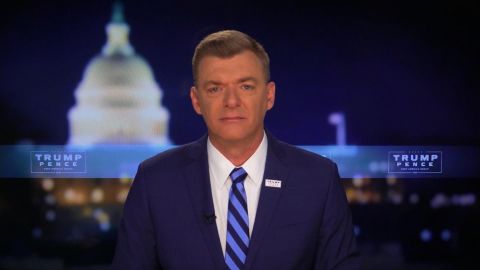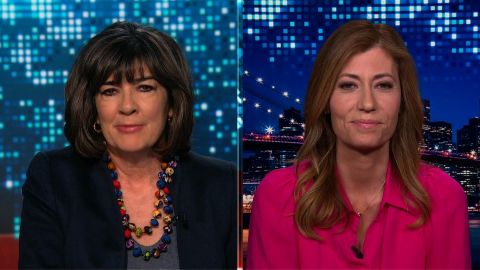Read Transcript EXPAND
CHRISTIANE AMANPOUR: As you know, Andrew Bosworth, who is a long time Facebook executive, he wrote in his company memo, Trump got elected — this is obviously about 2016 — because he ran the single best digital ad campaign I’ve ever seen from any advertiser, period. And Christian Science Monitor says, GOP officials say they have roughly 3,000 data points on every voter in the country, and as you said, you know, it’s the campaign and the RNC. So, what are you doing with it all?
MARC LOTTER, DIRECTOR OF STRATEGIC COMMUNICATIONS, TRUMP 2020 CAMPAIGN: Well, there’s multiple things that we can do with it. We will randomly send out surveys, so to speak, to many groups so we can identify what they’re thinking right now, whether it’s about a specific issue, about the upcoming election, how things are going for their state, even down the congressional levels. Then as we get closer and closer to the election, then we’re able to make sure that they know when their registration deadlines are in their states to make sure they’re registered to vote or to seek an absentee ballot. And then, obviously, as we approach early voting and election day, we can track to see whether folks have actually — if they will volunteer and tell us that they have voted, they plan to vote. Because ultimately, elections are about turnout, making sure that you get your supporters to the polls.
AMANPOUR: And we understand that there’s a whole new focus from your campaign on local news. Polling shows that most Americans trust local news more than the national. And your campaign manager said that the campaign intends to train swarms of surrogates to undermine negative coverage on Trump on local TV stations and newspapers. So, tell us what that’s going to look like.
LOTTER: Well, first and foremost, it’s making sure that folks who have — who spend a lot of time in their local media markets, whether they’re local elected officials or local political commentators, have access to the current data, and the current thinking of the campaign. So, when they go out there, they have the facts in hand. And ultimately, to your point, we do have a big focus on local media. I started my career in local television news and we understand that, while many people — especially in the United States who are watching the cable outlets, may have already made up their mind based on their choices. The folks who are watching local news are mostly concerned with what the weather is going to be like tomorrow, how to dress the kids for school, how to — you know, what about the traffic going into work or did their local sports teams win and what’s going on in their communities. So, it’s an ability for us to reach out to folks who are not necessarily hanging on every word that comes from Washington, D.C. or through the main media outlets in their political coverage.
AMANPOUR: Tell me a little bit, from your perspective, from the campaign perspective, of this big rownow over Russian meddling, the national — you know, the director of National Intelligence, et cetera. So, it appears that the president is upset that there was this briefing, it went to Congress, a briefing that the Russians were trying to meddle again on his behalf. Why is the campaign or the White House angry about these warnings from the Intelligence Community, given the sort of disruption last time around?
LOTTER: Well, I think, first part — to the first part of your question and the national security adviser, the president have both said, that they have not seen the intelligence that Russia is intending to meddle for a specific candidate. And even — there is another CNN report that I saw from last night where there — many intelligence officials are saying that the person who did that briefing probably said too much beyond what the actual intelligence was suggesting. And, of course, then that was weaponized, leaked to the media, whether it was to harm Bernie Sanders’ campaign or to sow discord in the — in the trust in the general election. I mean, that’s ultimately what Russia’s goal issue is, is to — to sow mistrust in the American electoral process. And one of the things that the president, the Homeland Security Department and all of our intelligence agencies are working for, along with our state partners, is to make sure that our election infrastructure is hardened and it is able to resist any kind of efforts to meddle in the actual counting of votes, the casting of votes, and then the reporting of that.
About This Episode EXPAND
Legal experts Anne Milgram and Douglas Wigdor join Christiane to assess the implications of Harvey Weinstein’s criminal convictions. Marc Lotter, director of strategic communications for the Trump 2020 campaign, joins the program to discuss President Trump’s first official visit to India. “Pod Save America” co-host Dan Pfeiffer tells Michel Martin how he thinks Democrats can win in November.
LEARN MORE



